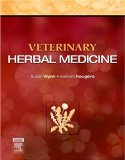Herbal medicine for dog care was around long before dogs were domesticated by humans.
Thousands of years ago, the ancient Greeks observed dogs’ innate ability to choose and eat wild herbs to prevent disease and stimulate healing. They believed that the Greek God of medicine, Asclepius, admired dogs the most because of this impressive trait.
We encourage you to read this page from start to finish, but feel free to click one of the following links to jump ahead…
How Your Dog Can Benefit from Dog Herbs
When used correctly, herbal medicine for dog care can can turn around the diminishing health of a sick or aging dog by:
- Improving the functions of the body organs
- Supporting overall body wellness
- Strengthening the immune system
Juliette de Bairacli Levy, renowned herbalist and natural dog care expert, states her amazement at the dog’s ability to select medicinal plants in nature:
“When I see my Afghan hounds in my gardens, or in the fields, or along the river-sides or sea-shores…I am always amazed at the way they have their medicinal plants, shrubs and trees, and know where to find them and how to use them.
By use, I mean the amount to be eaten to serve its purpose. Mostly their use is as a laxative or to promote vomiting, and they know exactly how much to achieve one or the other effect.”
Common Ailments Helped by Dog Herbal Remedies
Herbs are useful for a large number of everyday ailments including, but not limited to:
| Dog skin abrasions | Dog fleas, dog ticks and dog lice |
| Dog skin abscesses | Heart Weakness |
| Arthritis | Kidney Trouble |
| Dog bad breath | Nervousness |
| Dog urinary incontinence and bladder problems | Paralysis |
| Broken Bones | Poisoning |
| Dog eye problems | Dog vomiting |
| Dog diarrhea | Dog Insect Stings |
| Distemper in Dogs | Canine tumors (dog cancer) |
| Dog obesity | Dog worms |
Herb Safety for Dogs
If prepared and administered correctly, herbs are remarkably safe and quite easy to find and prepare. A growing number of pet owners are beginning to look at herbs in a new and beneficial light.
Californians seems to be leading the charge for herbal medicine for dog care, and a number of vets and pharmacies are opening to accommodate the new demand. Pets Unlimited out of Pacific Heights is one example. According the owner, Joe O’Hehir:
“Finally, people are ready for this… In the last few years we’ve really seen the demand grow, especially with the aging pet population.”
If you do not have a veterinary herbalist in your area, educate your local vet about your research. They can evaluate your findings and reach out to holistic vets in other areas to give you recommendations. You can also contact holistic vets in other areas for a phone consultation.
While herbal medicine for dog care can be extremely beneficial and are very safe if prepared and administered appropriately, they can also be poisonous if used incorrectly. You should consult with a professional herbalist or licensed vet before proceeding with treatment.
The following sections will review herbs to avoid along with proper herbal remedy preparation.
Herbs to Avoid
Even though the large majority of herbs are safe for our pets, there are still herbs which should be avoided.
Animals can also have allergies to certain substances or can be much more sensitive when they are ill, so it is good to test any new herb in a small amount (or smaller dose at first than what is recommended) to make sure it is safe for consistent use. Be on the safe side and only use herbs that have been approved and recommended by your veterinarian.
Most toxicity problems occur when inappropriate dosing is used. Although not an all-inclusive list, the following herbs have the possibility of being toxic if digested by your dog. It is recommended that these herbs only be used under the direct recommendation and supervision of a veterinary herbalist:
| Arnica | Ginko |
| Comfrey | Lobelia |
| Ephedra Garlic | Pennyroyal |
| Essential Oils | St. John’s wort |
| Garlic | Tea Tree Oil |
Dog Herbal Remedies Preparation Guidelines
Herbs are most effective when fed in the most efficient form. Depending on the herb, preparation could include:
- Infusion form of dog herbs
- Decoction form of dog herbs
- Tablet or capsule form of dog herbs
- Fresh plant cream form of dog herbs
Believe it or not, you probably have quite a few herbs in your pantry or garden that could be used to treat common dog health problems. Many fresh herbs such as parsley and thyme can be picked directly out of your garden and added to your dog’s regular food.
It is essential that you make sure the problem you wish to treat with herbs is not something more serious and life threatening. So again, speak with your vet before beginning any herbal treatment. Once your dog is cleared, there is a good chance that dog herbal medicine will succeed where other methods have failed!
Infusion Form for Dog Herbs
Creating an infusion of herbs for your dog is as simple as making a pot of tea. They are made using fresh or dried herbs, flowers, leaves or powdered roots.
- Pour one cup of boiling water over one teaspoon of herb in a cup or glass
- Keep the mixture covered and stir occasionally for 5 to 15 minutes
- Pour mixture through a coffee filter and add to dog’s food
Decoction Form for Dog Herbs
Making a decoction is very similar to an infusion but differs in the use of hard herbs such as solid roots or tree bark.
- Use one teaspoon of herb and place in a cup with cold water
- Bring the mixture to a boil and allow to boil for 5 to 10 minutes
- Remove from heat and cool before pouring through a coffee filter
- Make a fresh decoction every day and serve with food or filtered water
Taylor Tips!I really like it when my owners add some honey to an infusion or decoction. I have to admit I have a sweet tooth that is rarely satisfied! |
Tablet or Capsule Form for Dog Herbs
There are many herbal medicines designed especially for pets that are formulated into the capsule or tablet form.
Using this form of an herb is relatively simple and can be given to the dog at any time of day through the mouth. Many of the herbs used can have a very bitter taste, so try wrapping the tablet in a piece of cheese or meat to help it go down easier.
Fresh Plant Cream Form for Dog Herbs
Herbs such as echinacea and chickweed can be made into lotions for easy application the skin of your dog.
Such herbs are made into creams through a very simple process:
- Juice the fresh plant
- Pour the juice through a coffee filter
- Combine 10 ml of the juice with 50 g of vitamin E cream
- Apply the lotion to your dog at an appropriate time
Proper Herbal Dosage for Dogs
Veterinary herbalists specialize in herbal medicine for dog care and know exactly how to prescribe the correct dosage for your dog’s individual needs. If there is not a veterinary herbalist in your area, search the veterinary herbalist database and either contact one in another area or have your vet reach out.
Herbal medicine for dog care requires very specific dosing. It is smart to start with the smallest dose and work your way upwards under the supervision of your holistic veterinarian.
Herbs can also be used in combination to strengthen their properties and minimize the possibility of side effects.
What Dog Herbs Should I Have Available at Home?
Many of the following herbs are commonly found in the home and used by people for cooking and personal herbal therapies. It is a great idea to have the following herbs stored in your cabinets or growing fresh in your garden as many forms of herbal medicine for dog care are derived from them:
| Aloe | Dandelion |
| Calendula | Garlic |
| Catnip | Ginger |
| Chamomile | Green Tea |
| Comfrey | Peppermint |
| Corn Silk | Turmeric |
Recommended Herbal Medicine Dog Books
The following books include comprehensive information about herbal remedies and recipes:
Veterinary-Specific
- TOP PICK: Natural Health for Dogs and Cats by Dr. Richard Pitcairn
- TOP PICK: Veterinary for Herbal Medicine by Susan Wynn, DVM
- Manual of Natural Veterinary Medicine by Susan Wynn, DVM and Steve Marsden, DVM
- Four Paws Five Directions: A Guide to Chinese Medicine for Dogs and Cats by Dr. Cheryl Schwartz
- The Complete Herbal Handbook for the Dog and Cat by Juliette de Bairacli Levy
Not Veterinary-Specific (but still applicable)
- The Green Pharmacy by James A. Duke, PhD
- PDR for Herbal Medicines (Physician’s Desk Reference for Herbal Medicines)
How to Find a Veterinary Herbalist in Your Area
- The Veterinary Botanical Medicine Association (VBMA) is a “group of veterinarians and herbalists dedicated to developing responsible herbal practice by encouraging research and education, strengthening industry relations, keeping herbal tradition alive as a valid information source, and increasing professional acceptance of herbal medicine for animals.” Click here to search the VBMA Member Directory.
- If you cannot find a veterinary herbalist in your area through the VBMA, try a broader search for holistic veterinarians. Most holistic vets will have knowledge about herbal medicine for dog care. Click here to search for veterinary holistic vets in your state as compiled by the American Holistic Veterinary Medical Association. Here are some search tips for their site:
- You can select “Chinese Herbs” or “Western Herbs” in Step 2 (“Select Modality”) of the search for a more refined list. Since the “sort” function does not always work properly, try this:
- Click on the “Edit” button on the top of your Internet browser window
- Click “Find on this page”
- Type one of the following in the box:
- Name of your city (i.e. “San Francisco”)
- Your area code followed by a dash (i.e. “415-“)
- Continue to click “find next” to jump to each holistic vet in your area
- You can select “Chinese Herbs” or “Western Herbs” in Step 2 (“Select Modality”) of the search for a more refined list. Since the “sort” function does not always work properly, try this:
Do you believe in holistic pet care? If so, please tell your friends about us. Thank you for supporting our efforts!

